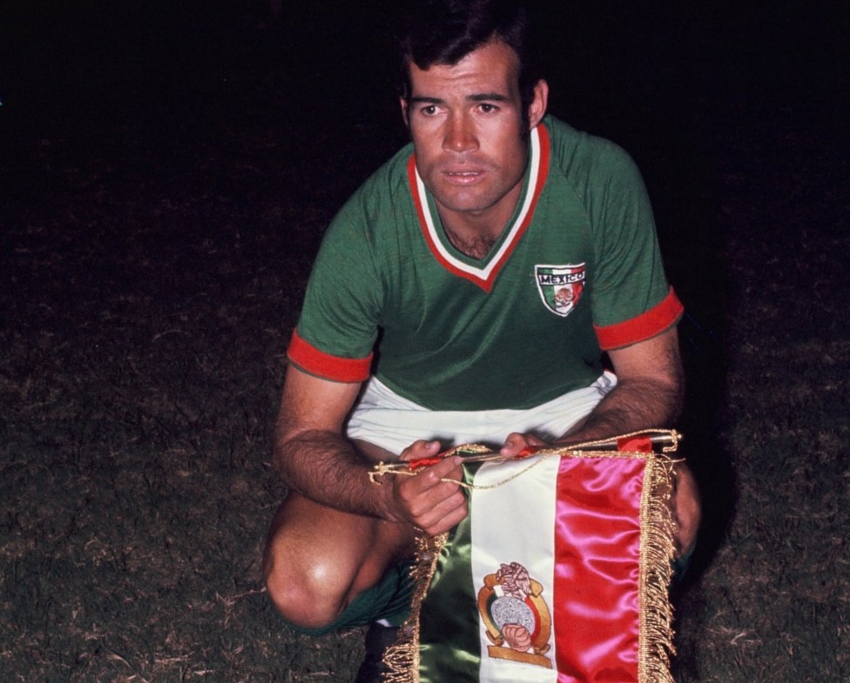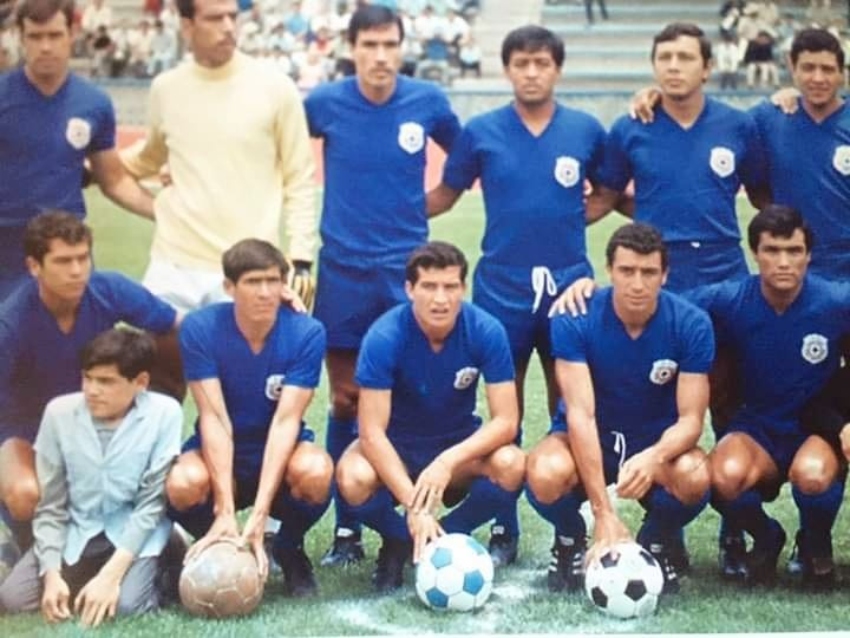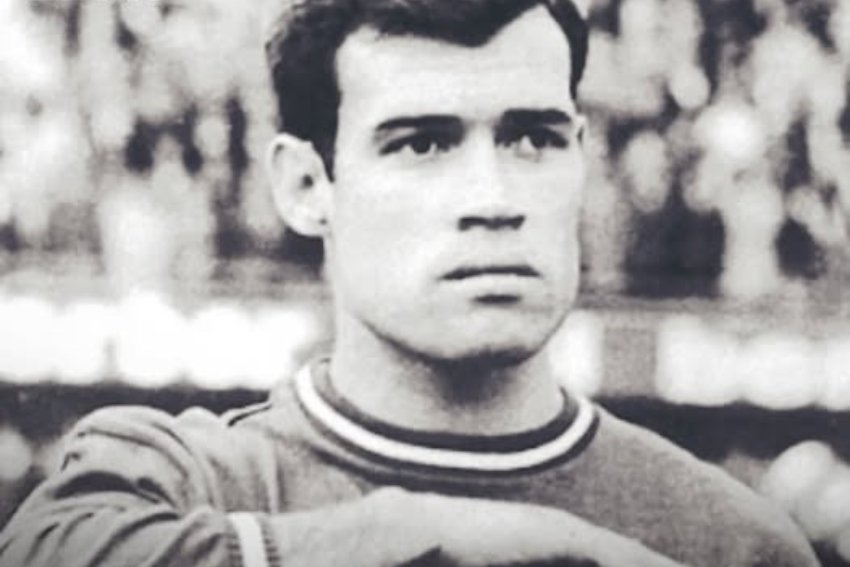Gustavo Peña was a hero of Mexican football who, at his peak, captained his country in two World Cup tournaments. This included 1970, when, in front of a passionate home crowd, Mexico fought through to the knockout stages of the tournament for the first time. Sadly, when Gustavo was at his peak in the 1960s, there was little video footage. So we can only watch him in grainy 5 and 10-second clips. However, those of us old enough to have seen him play will always have our memories.
In 1970, I was a young football fanatic in England, watching the opening games of the World Cup. In those days, it was the hosts (not the champions) who kicked off the tournament. Thus, Mexico played the USSR in the opening game. While not really expected to win the tournament, the Russians were tipped to do well. After all, they had finished third in 1966. As for Mexico, they had played 17 World Cup games in six tournaments and had only won one of them. However, that year, they were at home, and the whole nation expected better. I still remember the game and how every time the Russians hit the ball into the Mexico penalty area, there was Gustavo Peña rising to head it away.
The young career of Gustavo Peña

Born in Talpa de Allende, Jalisco, Gustavo played for much of his career in his native state. That started with Oro de Guadalajara, for whom he made his debut against Celaya at just 17 years of age. Oro was the ideal starting point for a young player, and Gustavo was quickly able to secure a first-team spot. It was at Oro that he found the perfect guru, the exceptional Hungarian coach Arpad Fekete. Under Fekete’s tutorship, Peña was promoted to team captain, a role he would hold in virtually every team he played for. At 18, he played in the 1962 World Cup qualifiers. Mexico made it to Chile, but an injured Peña stayed at home.
The 1962-63 season saw Peña, now 20 years old and already a regular international, marshal the defense as Oro made a surprising challenge for the league title. By now, he had a nickname, “Halcón,” given for his ability to “sweep down” and take the ball away from opponents. While Peña was a key player in defense, the great hero of this side was Manoel Tavares – better known as Neco. The striker was approaching the veteran stage of a career that had included ten years playing with Botafogo and São Paulo in his native Brazil.
The lone championship for Oro de Guadalajara
The last weekend of the championship could not have been more dramatic. Mighty Guadalajara arrived at the recently opened Jalisco Stadium, a point ahead of their opponents and needing only a draw to take the title. With the minutes ticking away, they were starting to look safe when Neco pounced for his 14th goal of the season. Peña and his defenders played their part, keeping the 6th clean sheet of the tournament. Oro were champions for the first and only time in their history.
The birth of a legend
Peña was still with Oro when he traveled to England for the 1966 World Cup. At 24, he was now captain of the Mexican team. They started with a draw against France. On reflection, it was the first sign in a World Cup tournament that Mexican football was maturing. Then it was hosts England, desperate for a win after an opening goalless draw with Uruguay. Mexico defended in depth, and with Peña marshalling the resistance from the back, England were held at bay for a frustrating 37 minutes. The great Bobby Charlton broke the deadlock with a shot from way outside the penalty area, and Mexico eventually lost 0-2.
However, they had retained their pride and went on to draw the last game with Uruguay. Although they failed to reach the knockout stages, it had been their best-ever tournament.
Peña finds a new home
Peña’s world changed after the 1966-67 season. He might well have been content to spend his whole career in the quiet surroundings of Oro, a local hero in a friendly club. However, the now-struggling club was sold, forcing the Mexican captain to look for a new home. The team he had always wanted to play for was Guadalajara, a local side he often represented as a guest player on their world tours. It never happened, thanks it seems, to boardroom politics.

Instead, Peña joined Cruz Azul. Now considered one of the giants of Mexico City football, at the time, they were only a few seasons out of the lower leagues and still based in Hidalgo. Peña would be there for four years, a spell that saw the emergence of the “La Máquina Celeste” (The Blue Machine) era. In all, Cruz Azul would win five of the seven league titles staged between 1969 and 1974. In addition, the team would win the CONCACAF Champions Cup on three occasions.
The 1970 World Cup
Another World Cup came around, this time in Mexico. There was Peña once again at the center of the defense, once again the captain. Only now, he was a 28-year-old veteran of 60 internationals and at the peak of his game. He formed a central partnership with Cruz Azul clubmate Javier Guzmán. With Guzmán crashing into the tackles, Peña could hang back, playing more as a sweeper than a traditional center half. His style and ability are summarized in three moments in the decisive game against Belgium. This was the last game of the group, and Belgium needed to win to go through. Mexico required only a draw. However, a win would give Mexico a better chance of topping the group and staying in Mexico City, where they could play in the magical atmosphere of the Estadio Azteca.
Peña’s memorable goal
In the 14th minute, Javier “El Cabo” Valdivia was brought down in the box by Jean Thissen. The Belgians complained bitterly, although it seemed a clear-cut decision. Thissen had wrapped his legs around his opponent’s knees. While the Belgians argued with the referee, there was a different debate going on in the Mexican camp. Who should take the spot kick? Peña was the regular and reliable penalty taker. But having won the penalty and with two goals to his credit already in the tournament, Valdivia felt he had a case. While wandering to the sideline to get water, Peña had a few words with coach Raúl Cárdenas. He confirmed that, yes, his captain should take the kick.
A man unfazed by pressure
Any extra pressure didn’t show. Peña hit the ball cleanly, the goalkeeper dived well but couldn’t reach it, and Mexico were ahead. There remained 76 minutes of tense football during which a talented Belgium side pushed relentlessly forward.
Two more moments stand out. Late in the first half, with Belgium attacking in waves, van Moer, the surprise star of the team in this tournament, spun around in the Mexican penalty area and tried a shot. In doing so, he slipped, and the ball fell harmlessly to Peña. He was on the edge of the 6-yard box, not somewhere you want to linger. But he calmly flicked the ball backwards through his own legs to let goalkeeper Calderón safely gather it up. It was a moment of class made to look so, so easy.
Late in the second half, Belgium’s Jean Dockx pushed past his marker and drove into the Mexican penalty area. It was a dangerous moment. But there was Peña, rushing across to cover, sliding into a powerful tackle that took the ball out of play. It was a hard, winning tackle, so clean and fair that the Belgians, who were increasingly irritable at this point in the game, did not make any protest.
The end of a remarkable career
Honors followed his World Cup performance, and Peña was included in a World Cup All-Star selection that flew to Russia to play in a testimonial game for legendary goalkeeper Lev Yashin. At home, his career was slowly winding down. There were several years at Monterrey and then a few last games at San Isidro Laguna. He went into management, but once again did not stray far from home, spending two spells and five years at modest Tampico Madero. He was also in charge of Mexico for one game, becoming the only manager to leave that position with a 100% win record. With less money in football in those days, Peña invested in a meat packing factory and, in his 60s, could be seen strolling the halls of his beloved Club Social y Deportivo Jalisco, where, for many years, he was general director of football.
The legacy of Gustavo Peña
On reflection, Peña had his faults as a player. He was an out-and-out defender, and if he ever wandered into the opponent’s half of the field, it was never caught on film. He sometimes seemed to be drawn so deep that he was in danger of getting in the way of his own keeper. This was certainly the case in the Belgium game, where goalkeeper Calderón, for all his experience, was not looking confident with crosses. On occasions, he was not helped by Peña rushing in to challenge for balls that should have been left for the keeper.
However, Peña did many things well. He was strong in the tackle, brave in the air and always had a good sense of what was going on around him. He was a reliable penalty taker — unfazed by the pressure. In an age when many defenders were more thug than artist, he was comfortable with the ball at his feet and could set up counterattacks with a crisp pass.
The Hall of Fame at last
Despite bringing steel to the defense, his reading of the game meant he seldom gave away free kicks. Above all, he was a natural leader who guided the players around him and brought the best out of the team. He was certainly one of the great players of his generation. This was made official in 1998 when CONCACAF named him in their Team of the Century. Another honour came, a little belatedly, in 2019 when he was inducted into the Mexican Football Hall of Fame.
Two years later, in January 2021, with the world in the grip of COVID, it was announced that Gustavo ‘Halcón’ Peña had fallen victim to the pandemic. Time fades the memory, even of our heroes, but some of us still remember Gustavo Peña.
Bob Pateman is a Mexico-based historian, librarian and a life-term hasher. He is editor of On On Magazine, the international history magazine of hashing.




